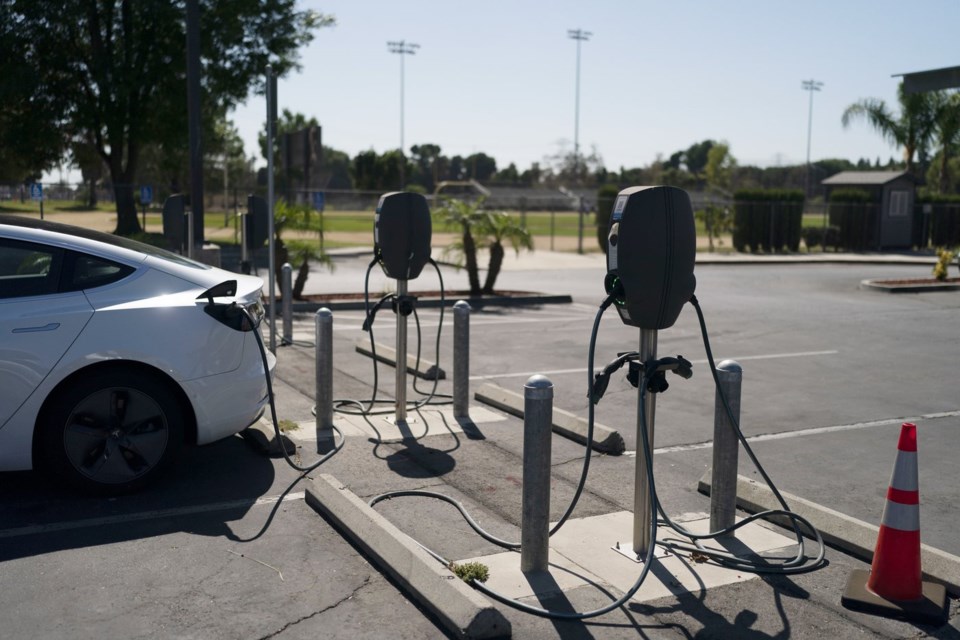SACRAMENTO, Calif. (AP) — Seventeen states are suing President Donald Trump 's administration for withholding billions of dollars for building more electric vehicle chargers, according to a federal lawsuit announced Wednesday.
The Trump administration in February directed states to stop spending money for electric vehicle charging infrastructure that was allocated under President Joe Biden — part of a broader push by the Republican president to roll back environmental policies advanced by his Democratic predecessor. The EV charger program was set to allocate $5 billion over five years to various states, of which an estimated $3.3 billion had already been made available.
The lawsuit is led by attorneys general from California, Colorado and Washington, and challenges the Federal Highway Administration's authority to halt the funding. They argue Congress, which approved the money in 2021 as part of the Bipartisan Infrastructure Law, holds that authority.
"These funds were going to be used to shape the future of transportation,” California Attorney General Rob Bonta said, calling it “short-sighted” of Trump to revoke the funds.
“We won’t sit back while the Trump administration violates the law,” Bonta, a Democrat, said.
The U.S. Department of Transportation did not respond to a request for comment on the lawsuit.
EVs stood at about 8% of new car sales in the U.S. last year, according to Motorintelligence.com, a sign the market is growing — although the pace has slowed as the auto industry tries to convince mainstream buyers about going electric. The program was meant to assuage some concerns and build infrastructure along highway corridors first, then address gaps elsewhere once the state highway obligations were met.
Some states with projects running under the program have already been reimbursed by the Biden-era federal funds. Others are still contracting for their sites. Still more had halted their plans by the time the Trump administration ordered states to stop their spending. Regardless, getting these chargers installed and operating has been a slow process with contracting challenges, permitting delays and complex electrical upgrades.
It was expected that states would fight against the federal government’s efforts to slow the nation’s electric vehicle charger buildout. New York, for example, which is part of the suit, has been awarded over $175 million in federal funds from the program, and state officials say $120 million is currently being withheld by the Trump administration.
Even the electric carmaker Tesla, run by Elon Musk, who has spearheaded Trump’s Department of Government Efficiency efforts to cut federal spending, benefited greatly from funding under the program, receiving millions of dollars to expand its already-massive footprint of chargers in the U.S.
Despite threats to the program, experts have said they expect the nation’s EV charging buildout to continue as automakers look to make good on massive electrification ambitions.
Consumers thinking about buying an EV often cite concerns about the availability of charging infrastructure. It's a hurdle for people living in multifamily dwellings and in rural areas, or what are otherwise known as “charging deserts.” It's also a problem for people who can't find a place to charge their vehicle near their work, or who often drive longer highway routes.
Democratic Gov. Gavin Newsom of California said withholding the funds was illegal and would kill thousands of U.S. jobs, ceding them to China.
"Instead of hawking Teslas on the White House lawn, President Trump could actually help Elon — and the nation — by following the law and releasing this bipartisan funding,” Newsom said, referencing Trump's recent purchase of a Tesla in a show of support for Musk.
The Trump administration’s effort to withdraw funding for electric vehicle chargers is part of a broader push to roll back environmental policies advanced under Biden.
During Trump’s first week back in office, he signed executive orders to pull the U.S. out of the Paris climate agreement again, reverse a 2030 target for electric vehicles to make up half of new cars sold, and end environmental justice efforts. At the same time, federal agencies under Trump have rolled back key rules and regulations and supported the build-out of the fossil fuel industry.
The U.S. House also advanced proposals last week aimed at blocking California from enforcing vehicle-emission rules, including a ban on the sale of new gas-powered cars by 2035. The Senate parliamentarian says the California policies are not subject to the review mechanism used by the House.
___
St. John reported from Detroit.
___
Austin is a corps member for The Associated Press/Report for America Statehouse News Initiative. Report for America is a nonprofit national service program that places journalists in local newsrooms to report on undercovered issues. Follow Austin on X: @sophieadanna
Sophie Austin And Alexa St. John, The Associated Press


